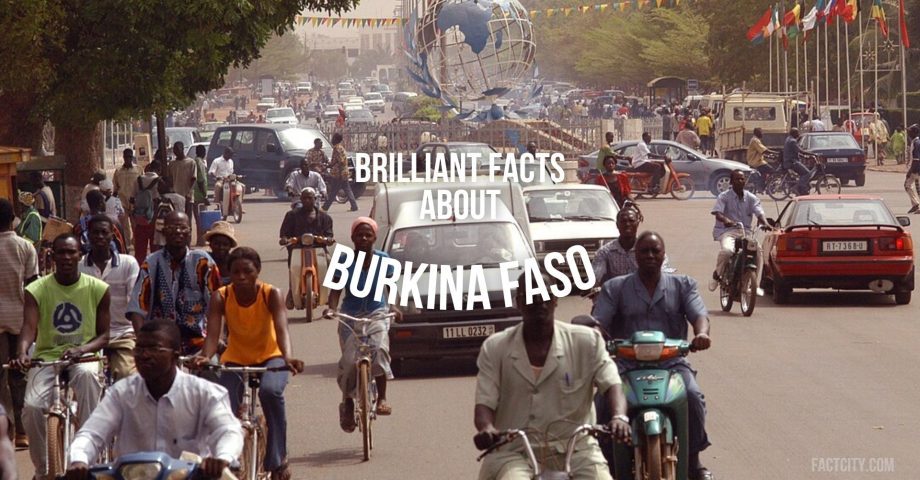Burkina Faso is one of the most historically interesting countries in Africa – it’s well-known for its gold reserves and its links to France. It’s also made its mark on the wider continent thanks to its vibrant textiles and its amazing arts and crafts scene – and UNESCO has even named part of the country a World Heritage Site.
But, how can you get to Burkina Faso from the UK? What’s the weather like here? What’s the exchange rate? All these questions (and more besides) will be answered in these interesting facts about Burkina Faso – so let’s dive in.
1. Burkina Faso doesn’t have a coastline, but has plenty of neighbours all the same.
Burkina Faso is completely landlocked, and you’ll find it towards the north-west of Africa. This means that it is surrounded by other countries – and more specifically, it can be found south of Mali, north-west of Benin, west of Niger, north-east of Cote d’Ivoire, and north of Togo and Ghana.
2. When it comes to size, Burkina Faso is somewhere in the middle of the African pack.
Burkina Faso is Africa’s 29th largest country, which puts it somewhere roughly in the middle of the continent’s 54 nations (not including independent states). It’s still pretty big, all things considered!
Burkina Faso covers an area of about 274,200 km squared, which is about 105,869 square miles. Compare that to our very own UK – which is around 244,376 square km, and 93,354 square miles. Therefore, Burkina Faso is about 12-13% bigger than our little island.
3. Millions of people call Burkina Faso home.
As of spring 2025, about 24 million people were living in Burkina Faso. The people of Burkina Faso are known as Burkinabé. And that word is both in the single and the plural form!
Again, let’s compare that with the United Kingdom. Comparatively, the UK is much more crowded – we have 69.5 million people living here, as of spring 2025. That means, despite being a smaller nation in terms of land area, we have more than double the population of Burkina Faso! Plenty of elbow room out here, then…
4. The capital of Burkina Faso is Ouagadougou.
Ouagadougou city covers an area of 520 square km (or 200 square miles), and, as of 2022, it recorded a population of about just over three million people. That means more than 10% of Burkina Faso’s population lives in the capital!
London, meanwhile, is a much bigger capital – at 1,572 square km and 607 square miles, it’s roughly three times the size of Ouagaougou.
If Ouagadougou looks like it might be the longest capital city name on the planet, you’d be mistaken. That honour belongs to Krung Thep Mahanakhon Amon Rattanakosin Mahinthara Yuthaya Mahadilok Phop Noppharat Ratchathani Burirom Udomratchaniwet Mahasathan Amon Piman Awatan Sathit Sakkathattiya Witsanukam Prasit. Or, as many people know it, Bangkok, Thailand!
5. The country was once known as Upper Volta.
The name Burkina Faso came from President Thomas Sankara, who changed the country’s title from the Republic of Upper Volta. The name ‘Burkina Faso’ is said to mean the ‘land of honest people’, or the “land of Incorruptible People”. Either way, that’s a pretty impressive title to lead with!
The name “Upper Volta” was established by French colonists post-World War I. The country didn’t technically exist as a nation up to this point, as it was an amalgamation of territories within Côte d’Ivoire and the former colony of Upper Senegal and Niger. It was so-called because it contained the upper stretch of the River Volta.
Upper Volta gained independence from France in 1960, but wouldn’t change its name to Burkina Faso until 1984!
6. Burkina Faso is bursting with elephants.
Burkina Faso is home to West Africa’s largest elephant population, making it a fantastic site for anyone fascinated by majestic pachyderms. Specifically, there are thought to be more than 6,000 elephants living in Burkina Faso.
Thankfully, the country is committed to protecting its tusked population, having joined the Elephant Protection Initiative in 2023, in an effort to help conserve its burgeoning (but still potentially threatened) population.
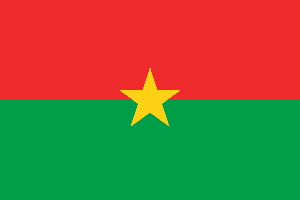
7. Burkina Faso is tropical and bright.
Across the country, Burkina Faso enjoys warm, dry winters and generally hot and wet summers, thanks to its prime tropical location. On average, you can expect temperatures here of almost 30°C, a world away from the chillier expectations here in the UK, where we can usually expect maximum temperatures of around 25°C.
The average rainfall in Burkina Faso really does vary depending on what zone you’re travelling in. Across the country, however, you’re likely to see rain pour down at anywhere between 600 and 1200mm every year. In the UK, we see between 800 and 1400mm rain every year – meaning we win out on being the wetter of the two countries (and to be fair, were you really surprised?).
8. Burkina Faso is very ethnically diverse.
There are 66 different ethnic groups in Burkina Faso! These include indigenous peoples such as the M’bororo Fulani and the Tuareg. And each group has their own beliefs, traditions, and even music – making the country one of the richest in terms of cultural diversity. There are around 70 different languages spoken across the nation.
In the UK, there are thought to be around 19 ethnic groups, according to Census data from 2021. In terms of languages spoken, no one’s quite sure of the number – but more than 300 are spoken in London alone, meaning despite lower ethnic diversity, there are far more languages spoken in the UK!
The official language in Burkina Faso is French. However, there are also multiple local languages, including Dioula, Tamasheq, Gourma, and Mooré.
9. Burkina Faso has a very diverse industry, too.
Burkina Faso is known for growing peanuts, shea nuts, sesame, and cotton. Their main exports include cotton, gold, and various livestock.
The main industries in Burkina Faso include beverages, soap, agricultural processing, etc. But, above all else, the biggest industry and export for the country is gold mining – and, raw cotton is close behind.
In terms of its general economy, Burkina Faso ranks somewhere just below the middle of most nations when it comes to global GDP. In 2023, it was estimated that it had the 121st largest economy out of 195 nations recorded. At this time, it was also noted that gold brought around $7.1 billion into Burkina Faso, with raw cotton bringing in around $262 million.
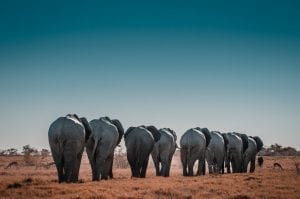
10. You’ll spend Francs here, but not French currency.
The currency used in Burkina Faso is the CFA franc. This is the case for all member states of the West African Economic and Monetary Union (UEMOA). Despite the country’s historic links with France, no – you won’t be able to spend Euros here.
At the time of writing, the exchange you’ll get for one British Pound totals around 780 CFA Francs. This has fluctuated hugely over the years, particularly post-pandemic. However, in 2015, you could get more than 930 CFA Francs for one British Pound!
Of course, it’s always a good idea to get the latest rates from your bank or your trusted financial exchange before you travel – there are lots of factors that can affect the value of foreign exchange, and these rates won’t stay the same forever!
11. There’s tourism in Burkina Faso, but visits have decreased over the years.
Overall, pre-pandemic, Burkina Faso regularly welcomed over 140,000 people into the country every year. Of course, during 2020, thanks to social distancing and lockdown restrictions, the country witnessed far fewer visitors. What’s more, the country continues to suffer from terrorism, and is considered one of the deadliest nations on the planet to visit as a result.
Unfortunately, there are no exact figures to suggest how many visitors to Burkina Faso come from the UK! And, at present, there are no records to suggest how many British people live in the country at present.
There are very few people from Burkina Faso living in the UK, too, at least according to United Nations estimates from 2015 (which, admittedly, could well have changed dramatically by now!). As of the time of that survey, fewer than 300 Burkina Faso nationals were living in Britain.
12. There is no British Embassy in Burkina Faso, but help is available.
The UK doesn’t have an ambassador in Burkina Faso at present, with all support for British visitors and ex-pats being available from Ghana’s British Embassy in Accra. Even then, according to the British government’s website, there is no support available in-person.
You can contact this Embassy via the British High Commission, Accra, Julius Nyerere Link, off Gamel Abdul Nasser Avenue, PO Box 296, Accra, Ghana. More details are available through the High Commission’s official page.
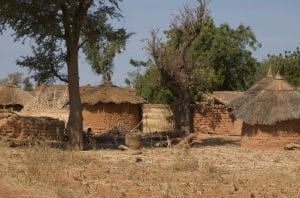
13. It’s not recommended for British travellers to visit Burkina Faso at all at present.
Perhaps one reason for a lack of data on British people travelling to Burkina Faso is because, right now, the government actively advises against anything but crucial travel to all parts of the country unless it’s the capital of Ouagadougou.
The government has imposed this advice as a result of the ongoing threats of terrorism and kidnapping across the country, with travellers potentially at risk from violent crime. However, it is worth noting that travel to any countries other than one’s own carries risk.
In Burkina Faso, there has been ongoing terrorist activity on behalf of multiple groups, including the Islamic State, meaning that many public places, such as shopping precincts, sports centres, festival areas, and even national parks are at risk from violence. It’s better to be safe rather than sorry, and to avoid travelling on national or religious holidays within the country.
While essential travel to Ouagadougou is permitted at the time of writing, the government also notes that there is increasing terrorist activity within the capital city itself.
14. There are certain travel and entry requirements if you’re heading to Burkina Faso.
If you do travel to Burkina Faso from the UK, do note that there are some requirements you’ll need to meet if you want to pass the border control.
To start, you will need a valid passport for the entirety of the time you wish to visit and stay. Plus, you will need to have at least two pages of your passport completely blank to account for stamps.
In addition to this, you’ll need a visa. You can apply for this through Brussels’ Burkina Faso Embassy, and it’s wise to do so as far ahead of your travel time as possible.
The government also notes that, if you’re travelling from an at-risk nation, you may need to have a valid yellow fever vaccination. It’s also recommended that you have up-to-date MMR, diphtheria, tetanus, and polio injections before you board for travel. Most travellers should also consider vaccinations for typhoid and hepatitis A.
15. Travellers should be respectful during Ramadan.
Burkina Faso is a predominantly Muslim nation, meaning that it observes Ramadan, a holy month where there are certain societal and behavioural rules enforced. For example, if you travel here during Ramadan, you will not be allowed to curse in public, dance, play loud music, publicly eat, chew, or drink when the sun is up, or smoke before dusk. It is also highly advisable that you avoid drink and drugs.
Ramadan’s dates change each year, so if you are considering travelling here, make sure to check the calendar first and to ask for advice from any travel guides or hoteliers you are booking with.

16. Same-sex activity is legal in Burkina Faso, but might not be for long.
Interestingly, it is not illegal to engage in same-sex relationships or sexual activity in Burkina Faso. However, there is increasing interest in criminalising them – which means that LGBTQ+ travellers may be at risk from violence and intimidation.
At the time of writing, it is unclear how the state will impose laws against same-sex activity, but it is wise to be very careful with where you travel regardless of what is legal and what is not.
17. There are several world heritage sites in Burkina Faso.
UNESCO has recognised Burkina Faso’s heritage and natural beauty many times over! At the time of writing, there are four heritage landmarks that are officially registered. These include the Ruins of Loropéni, listed in 2009, the W-Arly-Pendjari Complex, listed in 2017, the Ancient Ferrous Metallurgy Sites of Burkina Faso, listed in 2019, and the Royal Court of Tiébélé, listed in 2024.
And, the world heritage really doesn’t stop there. Burkina Faso also has four tentative sites that could reach full protected status – the Bourzanga necropolises, the Mare aux Hippopotames Biosphere Reserve, the Burkinabè engravings found in Sahel, and Sya, the historic centre of Bobo-Dioulasso. That’s a lot to be proud of!
18. It’s easiest to travel from the UK to Burkina Faso by air.
Given the country’s landlocked location, it’s quickest and easiest to reach Ouagadougou from the UK via airline. For example, you’ll most likely get a swift connection from London Gatwick or Stansted, flying with Royal Air Marouc, Ethiopian Air, Turkish Airlines, Brussels Airlines, and more. You can, however, also find flights out of the UK from Manchester, Birmingham, Belfast, and Edinburgh.
The quickest flights from London to Ouagadougou usually take between 9-12 hours, with a stop included. However, you’ll also find that there are plenty of connections that take well over 24 hours, almost as many as 36 – with two or more layovers. Therefore, be prepared for a pretty long journey and to prepare yourself to relax!
Take my advice – it’s always a good idea to check websites and resources like Rome2Rio and SkyScanner online for the best and most efficient flights from the UK, regardless of where you’re going.
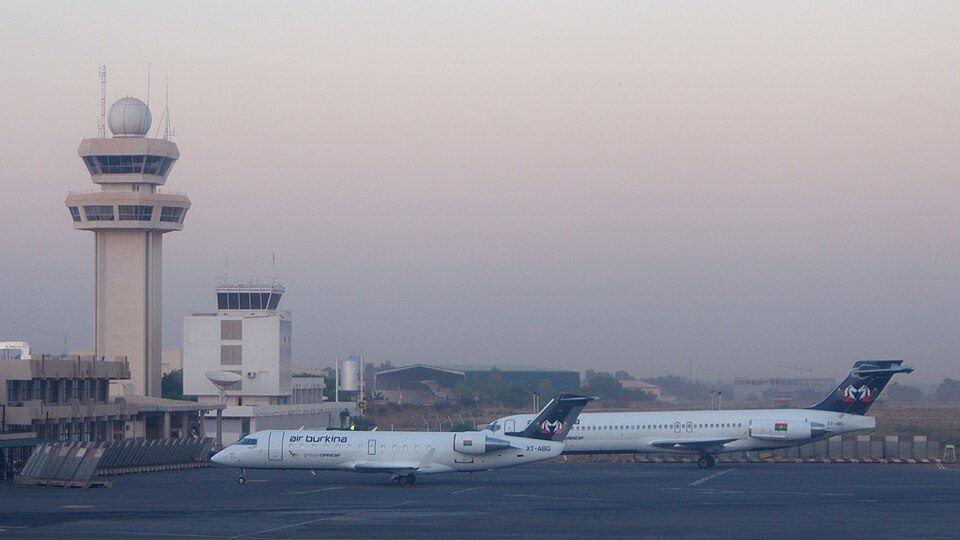
FAQs About Burkina Faso
What religion is followed the most in Burkina Faso?
There are multiple religions in Burkina Faso. Many people follow Islam and Christianity, as well as other traditional and animist religious beliefs. As the majority of the nation is Muslim, it’s wise to expect that religious periods such as Ramadan are devoutly observed here, and that if you are travelling, you should abide by these rules, too.
Is it safe to visit Burkina Faso?
Sadly, it is considered very dangerous to travel to Burkina Faso. There remains a high-level threat of terrorism in the country. In fact, Burkina Faso is currently believed to be the nation with the most deaths from terrorism on the planet – and it plays host to around 20% of all the world’s terrorism-related deaths. Only Pakistan and Syria are considered almost as deadly.
Is Burkina Faso French?
While Burkina Faso was indeed once a French colony, it now stands as an independent country. It was colonized by the French in 1896. In 1958, it became a self-governing French Colony. And it was only in 1960 that the area became a fully independent country, with Maurice Yaméogo as the president at the time. It was known as Upper Volta while under French rule, and the name changed to Burkina Faso in the early-mid 1980s.
Do you know any fun facts about Burkina Faso? Share them in the comments below!
